Analyzing the Economic Vulnerability of UK Businesses Post-Brexit
VerifiedAdded on 2023/06/13
|10
|2809
|425
Essay
AI Summary
This essay analyzes the economic impact of Brexit on UK businesses, focusing on the increased vulnerability to economic shocks and the adverse consequences for trade and GDP growth. It discusses how Brexit has weakened the UK's bargaining position in the global market, creating economic uncertainty and challenges for both domestic and international businesses. The analysis covers the effects of currency depreciation, disruptions in international supply chains, and the loss of single market access, highlighting the potential costs to the UK economy. While acknowledging the negative impacts, the essay also explores potential benefits such as cost savings from no longer contributing to the EU budget and the freedom to establish independent trade agreements. It further examines the political and legal environments, including changes in immigration laws and regulatory complexities, and concludes by considering the cultural aspects of doing business in the UK post-Brexit. Desklib offers a platform for students to access this essay and many other solved assignments.
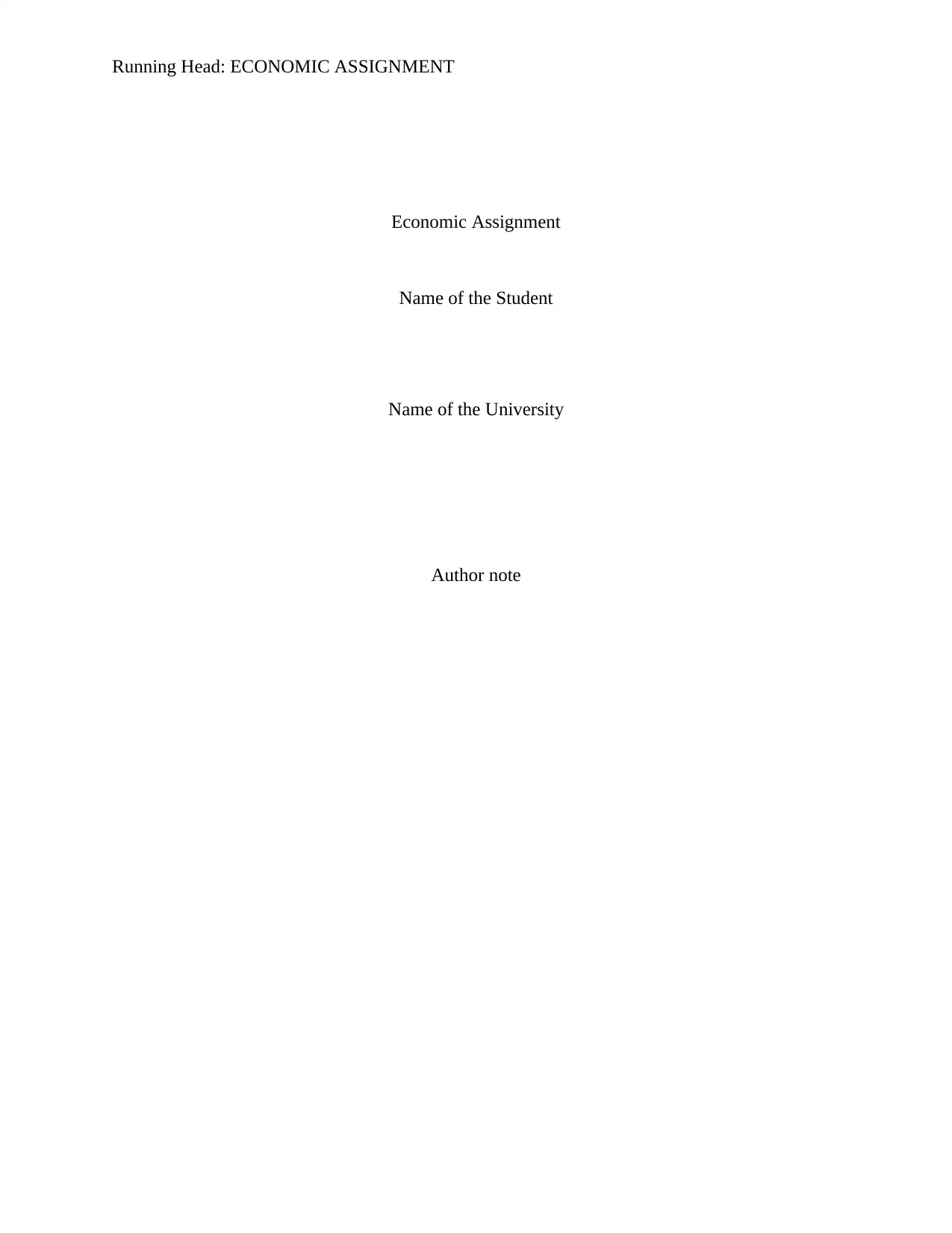
Running Head: ECONOMIC ASSIGNMENT
Economic Assignment
Name of the Student
Name of the University
Author note
Economic Assignment
Name of the Student
Name of the University
Author note
Paraphrase This Document
Need a fresh take? Get an instant paraphrase of this document with our AI Paraphraser
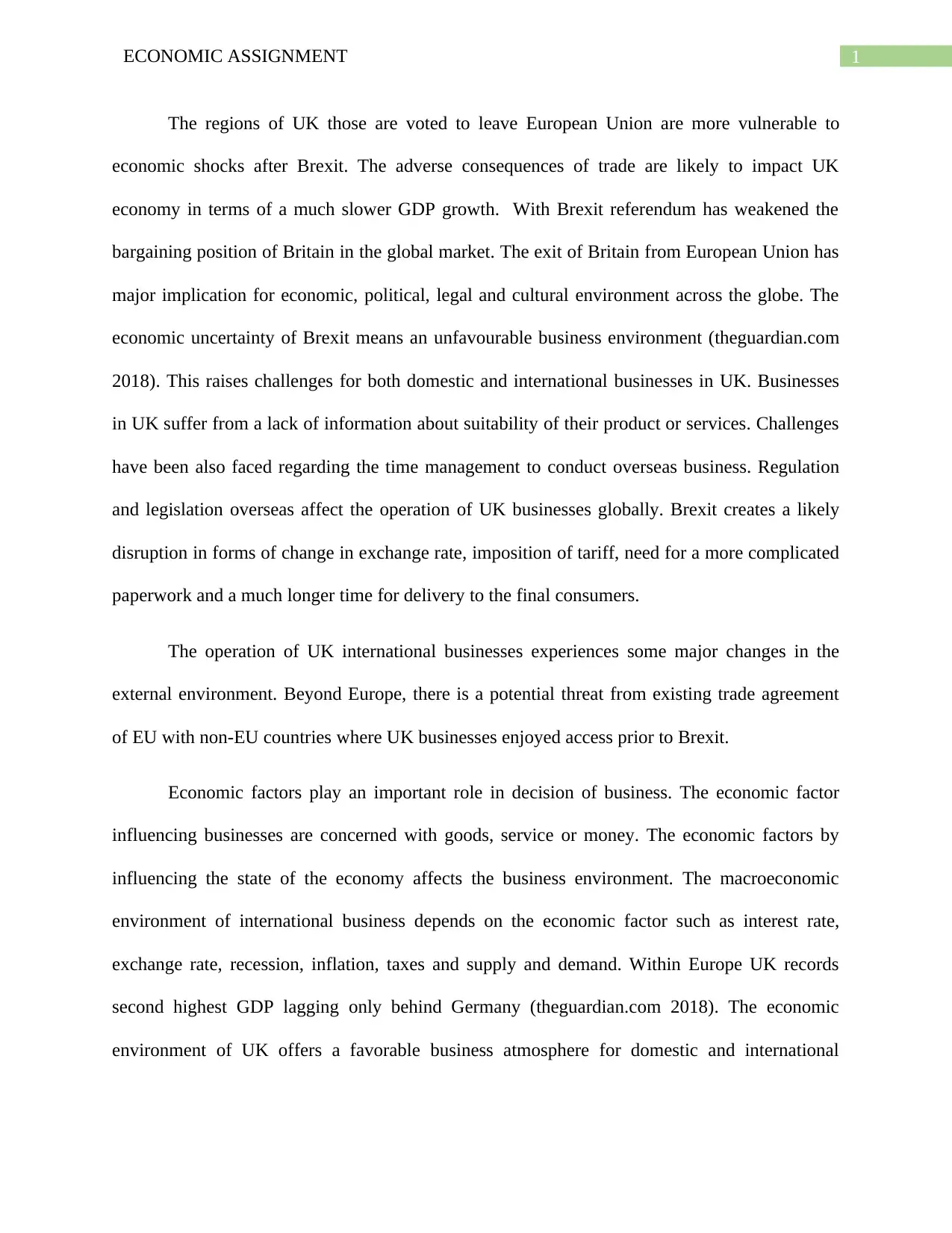
1ECONOMIC ASSIGNMENT
The regions of UK those are voted to leave European Union are more vulnerable to
economic shocks after Brexit. The adverse consequences of trade are likely to impact UK
economy in terms of a much slower GDP growth. With Brexit referendum has weakened the
bargaining position of Britain in the global market. The exit of Britain from European Union has
major implication for economic, political, legal and cultural environment across the globe. The
economic uncertainty of Brexit means an unfavourable business environment (theguardian.com
2018). This raises challenges for both domestic and international businesses in UK. Businesses
in UK suffer from a lack of information about suitability of their product or services. Challenges
have been also faced regarding the time management to conduct overseas business. Regulation
and legislation overseas affect the operation of UK businesses globally. Brexit creates a likely
disruption in forms of change in exchange rate, imposition of tariff, need for a more complicated
paperwork and a much longer time for delivery to the final consumers.
The operation of UK international businesses experiences some major changes in the
external environment. Beyond Europe, there is a potential threat from existing trade agreement
of EU with non-EU countries where UK businesses enjoyed access prior to Brexit.
Economic factors play an important role in decision of business. The economic factor
influencing businesses are concerned with goods, service or money. The economic factors by
influencing the state of the economy affects the business environment. The macroeconomic
environment of international business depends on the economic factor such as interest rate,
exchange rate, recession, inflation, taxes and supply and demand. Within Europe UK records
second highest GDP lagging only behind Germany (theguardian.com 2018). The economic
environment of UK offers a favorable business atmosphere for domestic and international
The regions of UK those are voted to leave European Union are more vulnerable to
economic shocks after Brexit. The adverse consequences of trade are likely to impact UK
economy in terms of a much slower GDP growth. With Brexit referendum has weakened the
bargaining position of Britain in the global market. The exit of Britain from European Union has
major implication for economic, political, legal and cultural environment across the globe. The
economic uncertainty of Brexit means an unfavourable business environment (theguardian.com
2018). This raises challenges for both domestic and international businesses in UK. Businesses
in UK suffer from a lack of information about suitability of their product or services. Challenges
have been also faced regarding the time management to conduct overseas business. Regulation
and legislation overseas affect the operation of UK businesses globally. Brexit creates a likely
disruption in forms of change in exchange rate, imposition of tariff, need for a more complicated
paperwork and a much longer time for delivery to the final consumers.
The operation of UK international businesses experiences some major changes in the
external environment. Beyond Europe, there is a potential threat from existing trade agreement
of EU with non-EU countries where UK businesses enjoyed access prior to Brexit.
Economic factors play an important role in decision of business. The economic factor
influencing businesses are concerned with goods, service or money. The economic factors by
influencing the state of the economy affects the business environment. The macroeconomic
environment of international business depends on the economic factor such as interest rate,
exchange rate, recession, inflation, taxes and supply and demand. Within Europe UK records
second highest GDP lagging only behind Germany (theguardian.com 2018). The economic
environment of UK offers a favorable business atmosphere for domestic and international
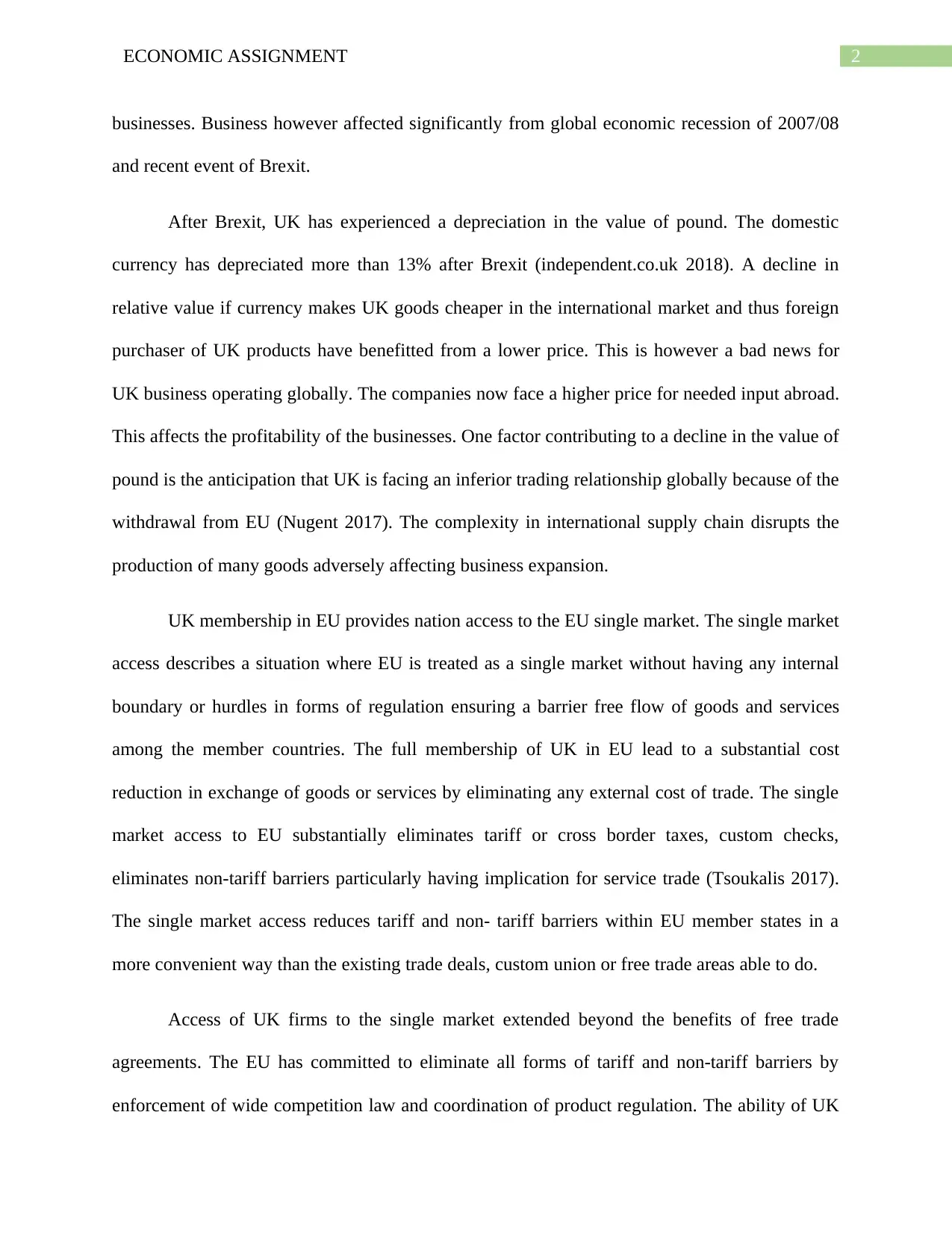
2ECONOMIC ASSIGNMENT
businesses. Business however affected significantly from global economic recession of 2007/08
and recent event of Brexit.
After Brexit, UK has experienced a depreciation in the value of pound. The domestic
currency has depreciated more than 13% after Brexit (independent.co.uk 2018). A decline in
relative value if currency makes UK goods cheaper in the international market and thus foreign
purchaser of UK products have benefitted from a lower price. This is however a bad news for
UK business operating globally. The companies now face a higher price for needed input abroad.
This affects the profitability of the businesses. One factor contributing to a decline in the value of
pound is the anticipation that UK is facing an inferior trading relationship globally because of the
withdrawal from EU (Nugent 2017). The complexity in international supply chain disrupts the
production of many goods adversely affecting business expansion.
UK membership in EU provides nation access to the EU single market. The single market
access describes a situation where EU is treated as a single market without having any internal
boundary or hurdles in forms of regulation ensuring a barrier free flow of goods and services
among the member countries. The full membership of UK in EU lead to a substantial cost
reduction in exchange of goods or services by eliminating any external cost of trade. The single
market access to EU substantially eliminates tariff or cross border taxes, custom checks,
eliminates non-tariff barriers particularly having implication for service trade (Tsoukalis 2017).
The single market access reduces tariff and non- tariff barriers within EU member states in a
more convenient way than the existing trade deals, custom union or free trade areas able to do.
Access of UK firms to the single market extended beyond the benefits of free trade
agreements. The EU has committed to eliminate all forms of tariff and non-tariff barriers by
enforcement of wide competition law and coordination of product regulation. The ability of UK
businesses. Business however affected significantly from global economic recession of 2007/08
and recent event of Brexit.
After Brexit, UK has experienced a depreciation in the value of pound. The domestic
currency has depreciated more than 13% after Brexit (independent.co.uk 2018). A decline in
relative value if currency makes UK goods cheaper in the international market and thus foreign
purchaser of UK products have benefitted from a lower price. This is however a bad news for
UK business operating globally. The companies now face a higher price for needed input abroad.
This affects the profitability of the businesses. One factor contributing to a decline in the value of
pound is the anticipation that UK is facing an inferior trading relationship globally because of the
withdrawal from EU (Nugent 2017). The complexity in international supply chain disrupts the
production of many goods adversely affecting business expansion.
UK membership in EU provides nation access to the EU single market. The single market
access describes a situation where EU is treated as a single market without having any internal
boundary or hurdles in forms of regulation ensuring a barrier free flow of goods and services
among the member countries. The full membership of UK in EU lead to a substantial cost
reduction in exchange of goods or services by eliminating any external cost of trade. The single
market access to EU substantially eliminates tariff or cross border taxes, custom checks,
eliminates non-tariff barriers particularly having implication for service trade (Tsoukalis 2017).
The single market access reduces tariff and non- tariff barriers within EU member states in a
more convenient way than the existing trade deals, custom union or free trade areas able to do.
Access of UK firms to the single market extended beyond the benefits of free trade
agreements. The EU has committed to eliminate all forms of tariff and non-tariff barriers by
enforcement of wide competition law and coordination of product regulation. The ability of UK
⊘ This is a preview!⊘
Do you want full access?
Subscribe today to unlock all pages.

Trusted by 1+ million students worldwide
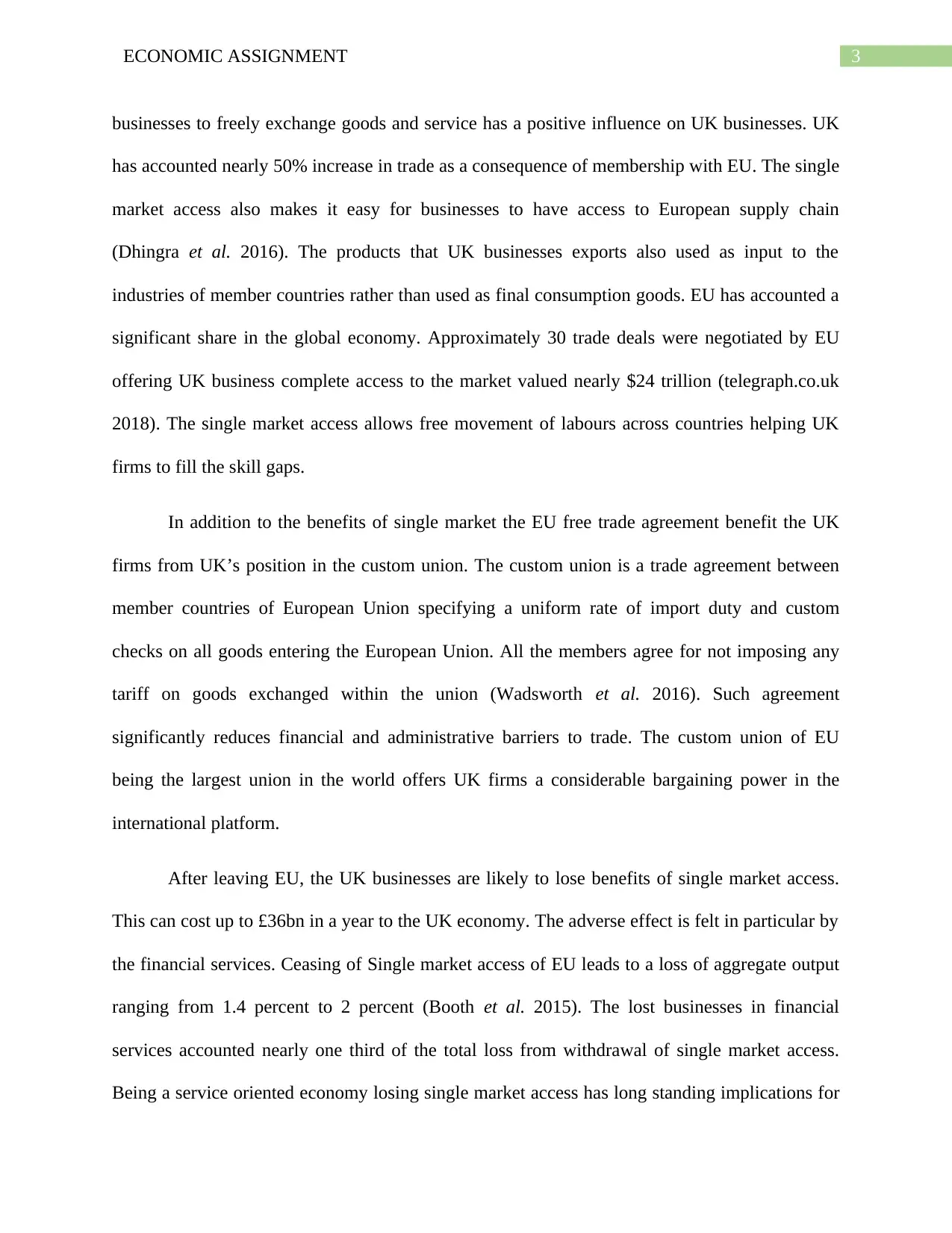
3ECONOMIC ASSIGNMENT
businesses to freely exchange goods and service has a positive influence on UK businesses. UK
has accounted nearly 50% increase in trade as a consequence of membership with EU. The single
market access also makes it easy for businesses to have access to European supply chain
(Dhingra et al. 2016). The products that UK businesses exports also used as input to the
industries of member countries rather than used as final consumption goods. EU has accounted a
significant share in the global economy. Approximately 30 trade deals were negotiated by EU
offering UK business complete access to the market valued nearly $24 trillion (telegraph.co.uk
2018). The single market access allows free movement of labours across countries helping UK
firms to fill the skill gaps.
In addition to the benefits of single market the EU free trade agreement benefit the UK
firms from UK’s position in the custom union. The custom union is a trade agreement between
member countries of European Union specifying a uniform rate of import duty and custom
checks on all goods entering the European Union. All the members agree for not imposing any
tariff on goods exchanged within the union (Wadsworth et al. 2016). Such agreement
significantly reduces financial and administrative barriers to trade. The custom union of EU
being the largest union in the world offers UK firms a considerable bargaining power in the
international platform.
After leaving EU, the UK businesses are likely to lose benefits of single market access.
This can cost up to £36bn in a year to the UK economy. The adverse effect is felt in particular by
the financial services. Ceasing of Single market access of EU leads to a loss of aggregate output
ranging from 1.4 percent to 2 percent (Booth et al. 2015). The lost businesses in financial
services accounted nearly one third of the total loss from withdrawal of single market access.
Being a service oriented economy losing single market access has long standing implications for
businesses to freely exchange goods and service has a positive influence on UK businesses. UK
has accounted nearly 50% increase in trade as a consequence of membership with EU. The single
market access also makes it easy for businesses to have access to European supply chain
(Dhingra et al. 2016). The products that UK businesses exports also used as input to the
industries of member countries rather than used as final consumption goods. EU has accounted a
significant share in the global economy. Approximately 30 trade deals were negotiated by EU
offering UK business complete access to the market valued nearly $24 trillion (telegraph.co.uk
2018). The single market access allows free movement of labours across countries helping UK
firms to fill the skill gaps.
In addition to the benefits of single market the EU free trade agreement benefit the UK
firms from UK’s position in the custom union. The custom union is a trade agreement between
member countries of European Union specifying a uniform rate of import duty and custom
checks on all goods entering the European Union. All the members agree for not imposing any
tariff on goods exchanged within the union (Wadsworth et al. 2016). Such agreement
significantly reduces financial and administrative barriers to trade. The custom union of EU
being the largest union in the world offers UK firms a considerable bargaining power in the
international platform.
After leaving EU, the UK businesses are likely to lose benefits of single market access.
This can cost up to £36bn in a year to the UK economy. The adverse effect is felt in particular by
the financial services. Ceasing of Single market access of EU leads to a loss of aggregate output
ranging from 1.4 percent to 2 percent (Booth et al. 2015). The lost businesses in financial
services accounted nearly one third of the total loss from withdrawal of single market access.
Being a service oriented economy losing single market access has long standing implications for
Paraphrase This Document
Need a fresh take? Get an instant paraphrase of this document with our AI Paraphraser
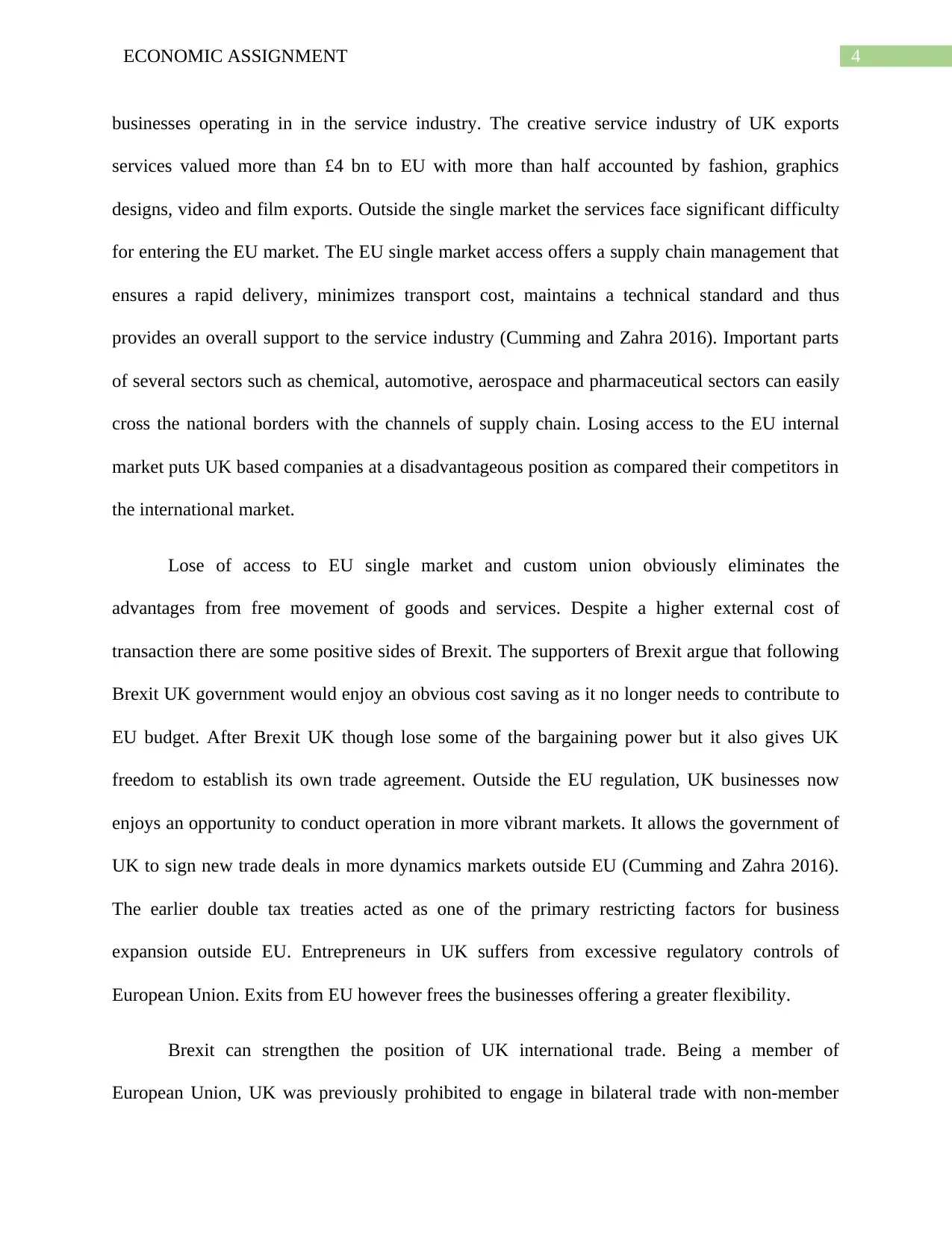
4ECONOMIC ASSIGNMENT
businesses operating in in the service industry. The creative service industry of UK exports
services valued more than £4 bn to EU with more than half accounted by fashion, graphics
designs, video and film exports. Outside the single market the services face significant difficulty
for entering the EU market. The EU single market access offers a supply chain management that
ensures a rapid delivery, minimizes transport cost, maintains a technical standard and thus
provides an overall support to the service industry (Cumming and Zahra 2016). Important parts
of several sectors such as chemical, automotive, aerospace and pharmaceutical sectors can easily
cross the national borders with the channels of supply chain. Losing access to the EU internal
market puts UK based companies at a disadvantageous position as compared their competitors in
the international market.
Lose of access to EU single market and custom union obviously eliminates the
advantages from free movement of goods and services. Despite a higher external cost of
transaction there are some positive sides of Brexit. The supporters of Brexit argue that following
Brexit UK government would enjoy an obvious cost saving as it no longer needs to contribute to
EU budget. After Brexit UK though lose some of the bargaining power but it also gives UK
freedom to establish its own trade agreement. Outside the EU regulation, UK businesses now
enjoys an opportunity to conduct operation in more vibrant markets. It allows the government of
UK to sign new trade deals in more dynamics markets outside EU (Cumming and Zahra 2016).
The earlier double tax treaties acted as one of the primary restricting factors for business
expansion outside EU. Entrepreneurs in UK suffers from excessive regulatory controls of
European Union. Exits from EU however frees the businesses offering a greater flexibility.
Brexit can strengthen the position of UK international trade. Being a member of
European Union, UK was previously prohibited to engage in bilateral trade with non-member
businesses operating in in the service industry. The creative service industry of UK exports
services valued more than £4 bn to EU with more than half accounted by fashion, graphics
designs, video and film exports. Outside the single market the services face significant difficulty
for entering the EU market. The EU single market access offers a supply chain management that
ensures a rapid delivery, minimizes transport cost, maintains a technical standard and thus
provides an overall support to the service industry (Cumming and Zahra 2016). Important parts
of several sectors such as chemical, automotive, aerospace and pharmaceutical sectors can easily
cross the national borders with the channels of supply chain. Losing access to the EU internal
market puts UK based companies at a disadvantageous position as compared their competitors in
the international market.
Lose of access to EU single market and custom union obviously eliminates the
advantages from free movement of goods and services. Despite a higher external cost of
transaction there are some positive sides of Brexit. The supporters of Brexit argue that following
Brexit UK government would enjoy an obvious cost saving as it no longer needs to contribute to
EU budget. After Brexit UK though lose some of the bargaining power but it also gives UK
freedom to establish its own trade agreement. Outside the EU regulation, UK businesses now
enjoys an opportunity to conduct operation in more vibrant markets. It allows the government of
UK to sign new trade deals in more dynamics markets outside EU (Cumming and Zahra 2016).
The earlier double tax treaties acted as one of the primary restricting factors for business
expansion outside EU. Entrepreneurs in UK suffers from excessive regulatory controls of
European Union. Exits from EU however frees the businesses offering a greater flexibility.
Brexit can strengthen the position of UK international trade. Being a member of
European Union, UK was previously prohibited to engage in bilateral trade with non-member
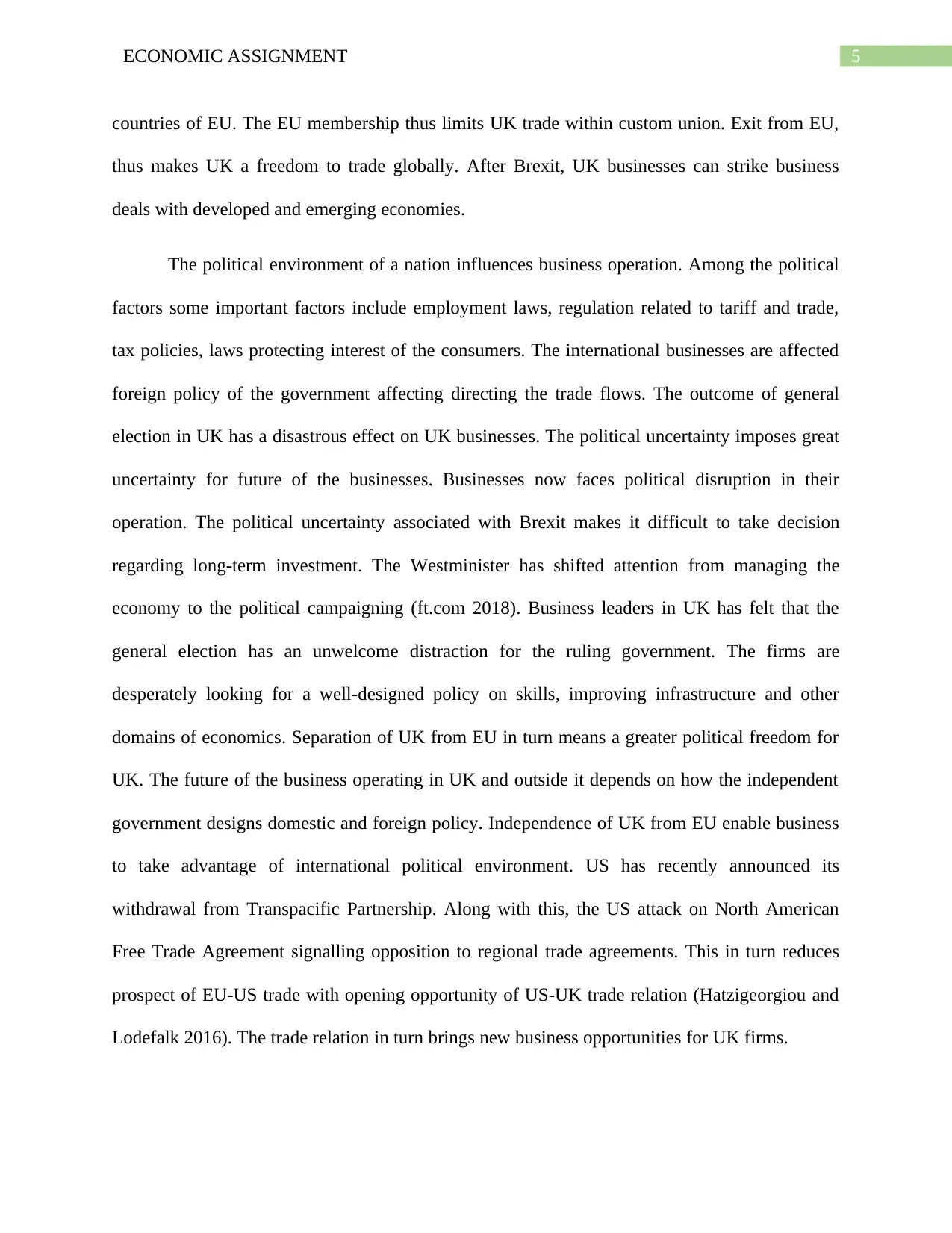
5ECONOMIC ASSIGNMENT
countries of EU. The EU membership thus limits UK trade within custom union. Exit from EU,
thus makes UK a freedom to trade globally. After Brexit, UK businesses can strike business
deals with developed and emerging economies.
The political environment of a nation influences business operation. Among the political
factors some important factors include employment laws, regulation related to tariff and trade,
tax policies, laws protecting interest of the consumers. The international businesses are affected
foreign policy of the government affecting directing the trade flows. The outcome of general
election in UK has a disastrous effect on UK businesses. The political uncertainty imposes great
uncertainty for future of the businesses. Businesses now faces political disruption in their
operation. The political uncertainty associated with Brexit makes it difficult to take decision
regarding long-term investment. The Westminister has shifted attention from managing the
economy to the political campaigning (ft.com 2018). Business leaders in UK has felt that the
general election has an unwelcome distraction for the ruling government. The firms are
desperately looking for a well-designed policy on skills, improving infrastructure and other
domains of economics. Separation of UK from EU in turn means a greater political freedom for
UK. The future of the business operating in UK and outside it depends on how the independent
government designs domestic and foreign policy. Independence of UK from EU enable business
to take advantage of international political environment. US has recently announced its
withdrawal from Transpacific Partnership. Along with this, the US attack on North American
Free Trade Agreement signalling opposition to regional trade agreements. This in turn reduces
prospect of EU-US trade with opening opportunity of US-UK trade relation (Hatzigeorgiou and
Lodefalk 2016). The trade relation in turn brings new business opportunities for UK firms.
countries of EU. The EU membership thus limits UK trade within custom union. Exit from EU,
thus makes UK a freedom to trade globally. After Brexit, UK businesses can strike business
deals with developed and emerging economies.
The political environment of a nation influences business operation. Among the political
factors some important factors include employment laws, regulation related to tariff and trade,
tax policies, laws protecting interest of the consumers. The international businesses are affected
foreign policy of the government affecting directing the trade flows. The outcome of general
election in UK has a disastrous effect on UK businesses. The political uncertainty imposes great
uncertainty for future of the businesses. Businesses now faces political disruption in their
operation. The political uncertainty associated with Brexit makes it difficult to take decision
regarding long-term investment. The Westminister has shifted attention from managing the
economy to the political campaigning (ft.com 2018). Business leaders in UK has felt that the
general election has an unwelcome distraction for the ruling government. The firms are
desperately looking for a well-designed policy on skills, improving infrastructure and other
domains of economics. Separation of UK from EU in turn means a greater political freedom for
UK. The future of the business operating in UK and outside it depends on how the independent
government designs domestic and foreign policy. Independence of UK from EU enable business
to take advantage of international political environment. US has recently announced its
withdrawal from Transpacific Partnership. Along with this, the US attack on North American
Free Trade Agreement signalling opposition to regional trade agreements. This in turn reduces
prospect of EU-US trade with opening opportunity of US-UK trade relation (Hatzigeorgiou and
Lodefalk 2016). The trade relation in turn brings new business opportunities for UK firms.
⊘ This is a preview!⊘
Do you want full access?
Subscribe today to unlock all pages.

Trusted by 1+ million students worldwide
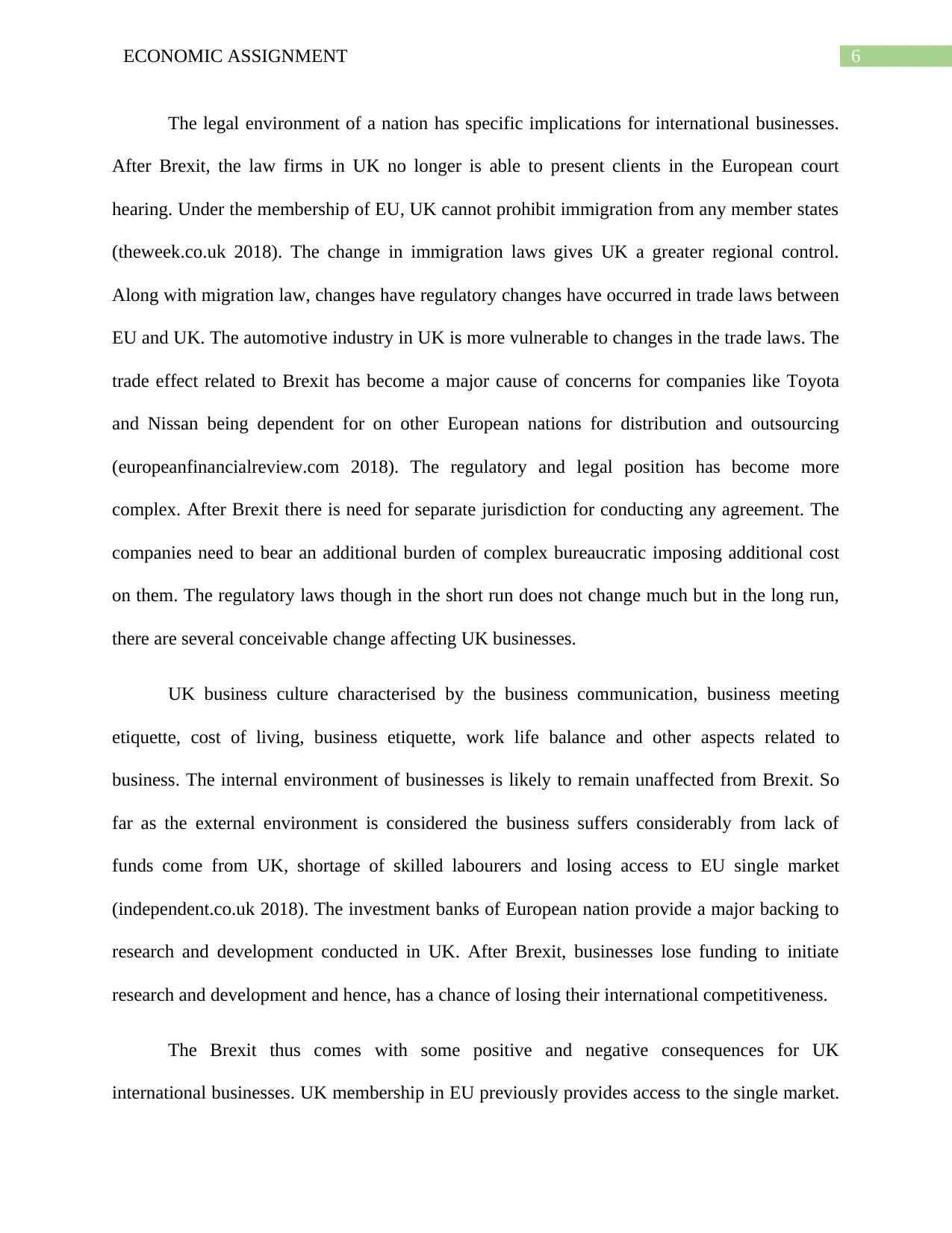
6ECONOMIC ASSIGNMENT
The legal environment of a nation has specific implications for international businesses.
After Brexit, the law firms in UK no longer is able to present clients in the European court
hearing. Under the membership of EU, UK cannot prohibit immigration from any member states
(theweek.co.uk 2018). The change in immigration laws gives UK a greater regional control.
Along with migration law, changes have regulatory changes have occurred in trade laws between
EU and UK. The automotive industry in UK is more vulnerable to changes in the trade laws. The
trade effect related to Brexit has become a major cause of concerns for companies like Toyota
and Nissan being dependent for on other European nations for distribution and outsourcing
(europeanfinancialreview.com 2018). The regulatory and legal position has become more
complex. After Brexit there is need for separate jurisdiction for conducting any agreement. The
companies need to bear an additional burden of complex bureaucratic imposing additional cost
on them. The regulatory laws though in the short run does not change much but in the long run,
there are several conceivable change affecting UK businesses.
UK business culture characterised by the business communication, business meeting
etiquette, cost of living, business etiquette, work life balance and other aspects related to
business. The internal environment of businesses is likely to remain unaffected from Brexit. So
far as the external environment is considered the business suffers considerably from lack of
funds come from UK, shortage of skilled labourers and losing access to EU single market
(independent.co.uk 2018). The investment banks of European nation provide a major backing to
research and development conducted in UK. After Brexit, businesses lose funding to initiate
research and development and hence, has a chance of losing their international competitiveness.
The Brexit thus comes with some positive and negative consequences for UK
international businesses. UK membership in EU previously provides access to the single market.
The legal environment of a nation has specific implications for international businesses.
After Brexit, the law firms in UK no longer is able to present clients in the European court
hearing. Under the membership of EU, UK cannot prohibit immigration from any member states
(theweek.co.uk 2018). The change in immigration laws gives UK a greater regional control.
Along with migration law, changes have regulatory changes have occurred in trade laws between
EU and UK. The automotive industry in UK is more vulnerable to changes in the trade laws. The
trade effect related to Brexit has become a major cause of concerns for companies like Toyota
and Nissan being dependent for on other European nations for distribution and outsourcing
(europeanfinancialreview.com 2018). The regulatory and legal position has become more
complex. After Brexit there is need for separate jurisdiction for conducting any agreement. The
companies need to bear an additional burden of complex bureaucratic imposing additional cost
on them. The regulatory laws though in the short run does not change much but in the long run,
there are several conceivable change affecting UK businesses.
UK business culture characterised by the business communication, business meeting
etiquette, cost of living, business etiquette, work life balance and other aspects related to
business. The internal environment of businesses is likely to remain unaffected from Brexit. So
far as the external environment is considered the business suffers considerably from lack of
funds come from UK, shortage of skilled labourers and losing access to EU single market
(independent.co.uk 2018). The investment banks of European nation provide a major backing to
research and development conducted in UK. After Brexit, businesses lose funding to initiate
research and development and hence, has a chance of losing their international competitiveness.
The Brexit thus comes with some positive and negative consequences for UK
international businesses. UK membership in EU previously provides access to the single market.
Paraphrase This Document
Need a fresh take? Get an instant paraphrase of this document with our AI Paraphraser
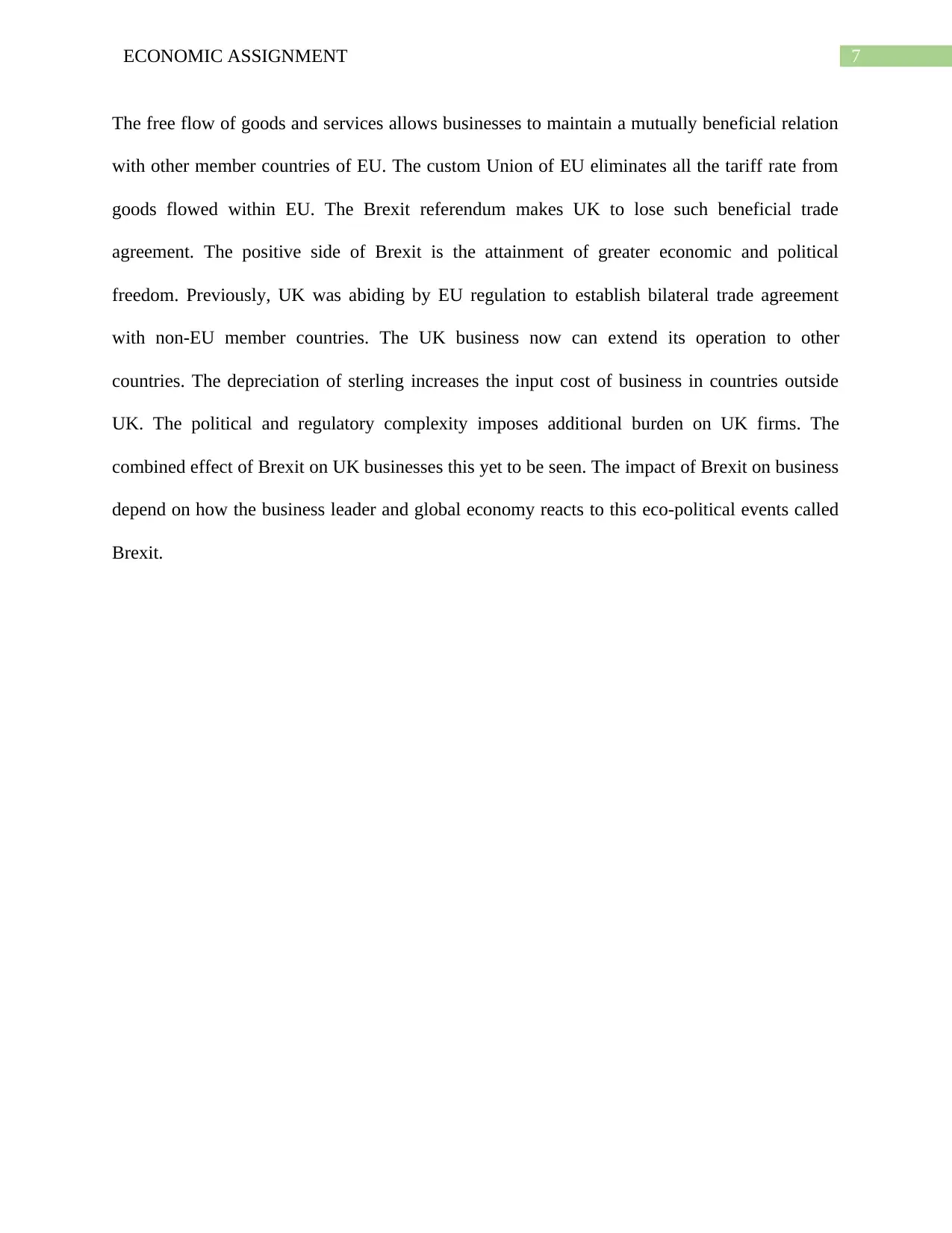
7ECONOMIC ASSIGNMENT
The free flow of goods and services allows businesses to maintain a mutually beneficial relation
with other member countries of EU. The custom Union of EU eliminates all the tariff rate from
goods flowed within EU. The Brexit referendum makes UK to lose such beneficial trade
agreement. The positive side of Brexit is the attainment of greater economic and political
freedom. Previously, UK was abiding by EU regulation to establish bilateral trade agreement
with non-EU member countries. The UK business now can extend its operation to other
countries. The depreciation of sterling increases the input cost of business in countries outside
UK. The political and regulatory complexity imposes additional burden on UK firms. The
combined effect of Brexit on UK businesses this yet to be seen. The impact of Brexit on business
depend on how the business leader and global economy reacts to this eco-political events called
Brexit.
The free flow of goods and services allows businesses to maintain a mutually beneficial relation
with other member countries of EU. The custom Union of EU eliminates all the tariff rate from
goods flowed within EU. The Brexit referendum makes UK to lose such beneficial trade
agreement. The positive side of Brexit is the attainment of greater economic and political
freedom. Previously, UK was abiding by EU regulation to establish bilateral trade agreement
with non-EU member countries. The UK business now can extend its operation to other
countries. The depreciation of sterling increases the input cost of business in countries outside
UK. The political and regulatory complexity imposes additional burden on UK firms. The
combined effect of Brexit on UK businesses this yet to be seen. The impact of Brexit on business
depend on how the business leader and global economy reacts to this eco-political events called
Brexit.
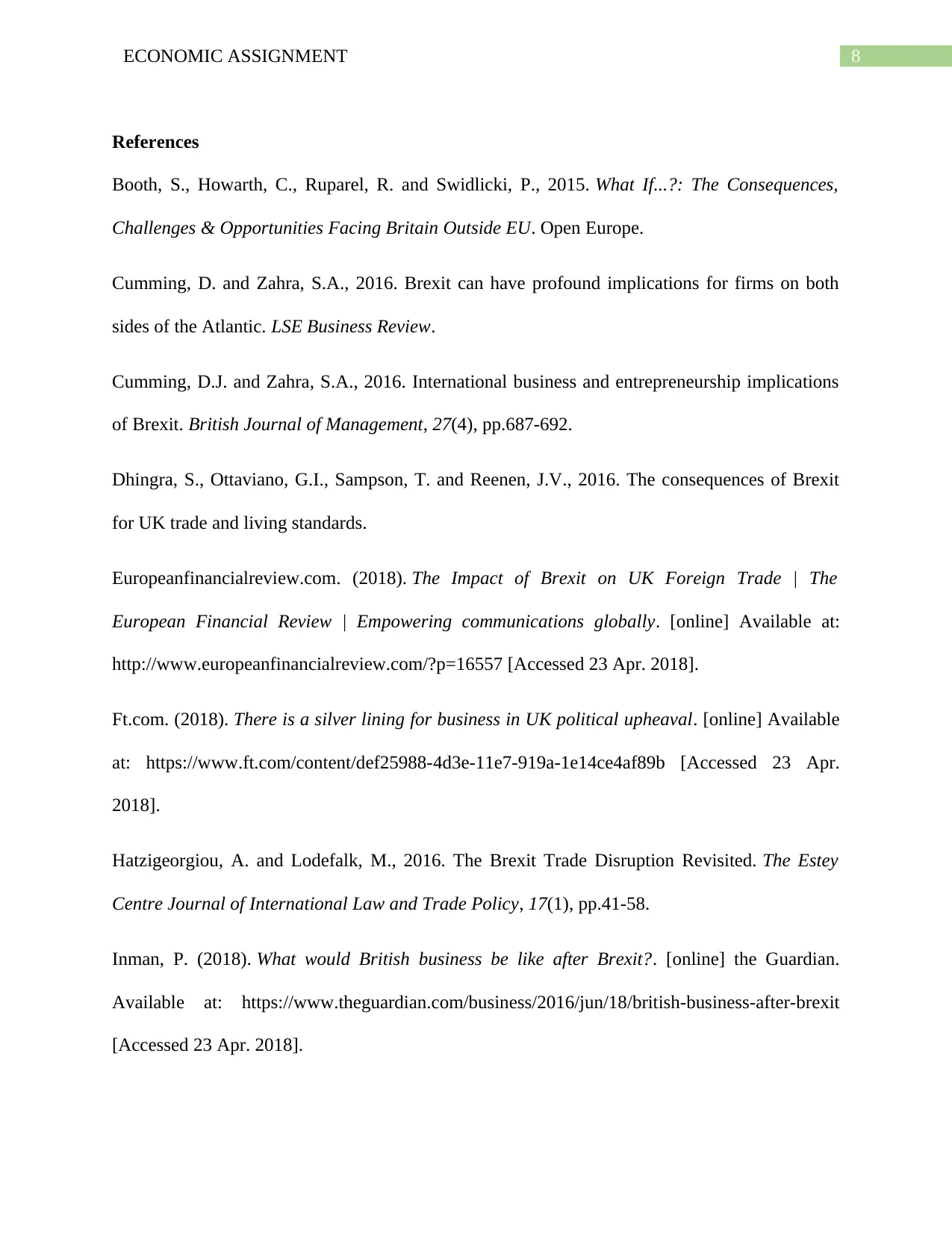
8ECONOMIC ASSIGNMENT
References
Booth, S., Howarth, C., Ruparel, R. and Swidlicki, P., 2015. What If...?: The Consequences,
Challenges & Opportunities Facing Britain Outside EU. Open Europe.
Cumming, D. and Zahra, S.A., 2016. Brexit can have profound implications for firms on both
sides of the Atlantic. LSE Business Review.
Cumming, D.J. and Zahra, S.A., 2016. International business and entrepreneurship implications
of Brexit. British Journal of Management, 27(4), pp.687-692.
Dhingra, S., Ottaviano, G.I., Sampson, T. and Reenen, J.V., 2016. The consequences of Brexit
for UK trade and living standards.
Europeanfinancialreview.com. (2018). The Impact of Brexit on UK Foreign Trade | The
European Financial Review | Empowering communications globally. [online] Available at:
http://www.europeanfinancialreview.com/?p=16557 [Accessed 23 Apr. 2018].
Ft.com. (2018). There is a silver lining for business in UK political upheaval. [online] Available
at: https://www.ft.com/content/def25988-4d3e-11e7-919a-1e14ce4af89b [Accessed 23 Apr.
2018].
Hatzigeorgiou, A. and Lodefalk, M., 2016. The Brexit Trade Disruption Revisited. The Estey
Centre Journal of International Law and Trade Policy, 17(1), pp.41-58.
Inman, P. (2018). What would British business be like after Brexit?. [online] the Guardian.
Available at: https://www.theguardian.com/business/2016/jun/18/british-business-after-brexit
[Accessed 23 Apr. 2018].
References
Booth, S., Howarth, C., Ruparel, R. and Swidlicki, P., 2015. What If...?: The Consequences,
Challenges & Opportunities Facing Britain Outside EU. Open Europe.
Cumming, D. and Zahra, S.A., 2016. Brexit can have profound implications for firms on both
sides of the Atlantic. LSE Business Review.
Cumming, D.J. and Zahra, S.A., 2016. International business and entrepreneurship implications
of Brexit. British Journal of Management, 27(4), pp.687-692.
Dhingra, S., Ottaviano, G.I., Sampson, T. and Reenen, J.V., 2016. The consequences of Brexit
for UK trade and living standards.
Europeanfinancialreview.com. (2018). The Impact of Brexit on UK Foreign Trade | The
European Financial Review | Empowering communications globally. [online] Available at:
http://www.europeanfinancialreview.com/?p=16557 [Accessed 23 Apr. 2018].
Ft.com. (2018). There is a silver lining for business in UK political upheaval. [online] Available
at: https://www.ft.com/content/def25988-4d3e-11e7-919a-1e14ce4af89b [Accessed 23 Apr.
2018].
Hatzigeorgiou, A. and Lodefalk, M., 2016. The Brexit Trade Disruption Revisited. The Estey
Centre Journal of International Law and Trade Policy, 17(1), pp.41-58.
Inman, P. (2018). What would British business be like after Brexit?. [online] the Guardian.
Available at: https://www.theguardian.com/business/2016/jun/18/british-business-after-brexit
[Accessed 23 Apr. 2018].
⊘ This is a preview!⊘
Do you want full access?
Subscribe today to unlock all pages.

Trusted by 1+ million students worldwide
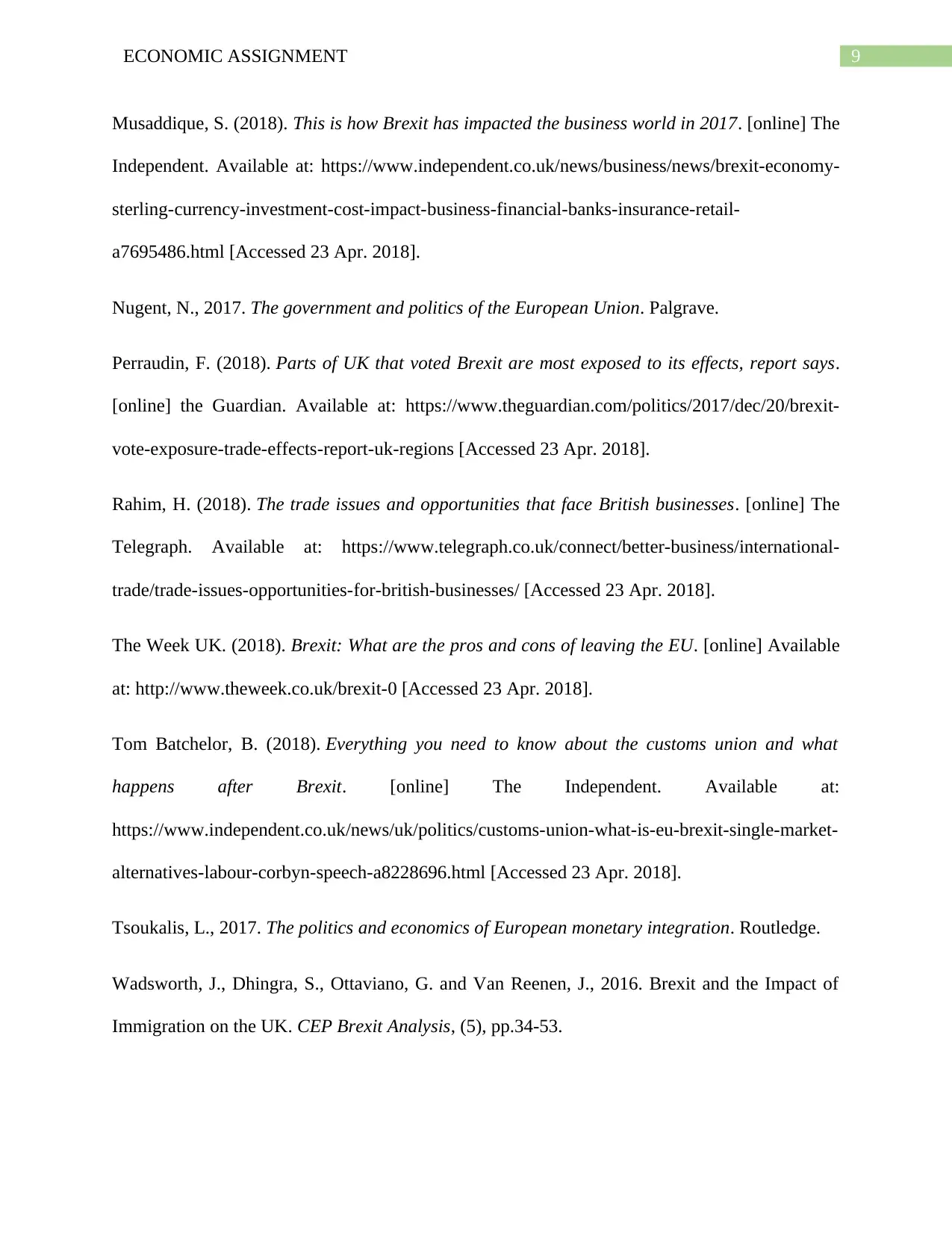
9ECONOMIC ASSIGNMENT
Musaddique, S. (2018). This is how Brexit has impacted the business world in 2017. [online] The
Independent. Available at: https://www.independent.co.uk/news/business/news/brexit-economy-
sterling-currency-investment-cost-impact-business-financial-banks-insurance-retail-
a7695486.html [Accessed 23 Apr. 2018].
Nugent, N., 2017. The government and politics of the European Union. Palgrave.
Perraudin, F. (2018). Parts of UK that voted Brexit are most exposed to its effects, report says.
[online] the Guardian. Available at: https://www.theguardian.com/politics/2017/dec/20/brexit-
vote-exposure-trade-effects-report-uk-regions [Accessed 23 Apr. 2018].
Rahim, H. (2018). The trade issues and opportunities that face British businesses. [online] The
Telegraph. Available at: https://www.telegraph.co.uk/connect/better-business/international-
trade/trade-issues-opportunities-for-british-businesses/ [Accessed 23 Apr. 2018].
The Week UK. (2018). Brexit: What are the pros and cons of leaving the EU. [online] Available
at: http://www.theweek.co.uk/brexit-0 [Accessed 23 Apr. 2018].
Tom Batchelor, B. (2018). Everything you need to know about the customs union and what
happens after Brexit. [online] The Independent. Available at:
https://www.independent.co.uk/news/uk/politics/customs-union-what-is-eu-brexit-single-market-
alternatives-labour-corbyn-speech-a8228696.html [Accessed 23 Apr. 2018].
Tsoukalis, L., 2017. The politics and economics of European monetary integration. Routledge.
Wadsworth, J., Dhingra, S., Ottaviano, G. and Van Reenen, J., 2016. Brexit and the Impact of
Immigration on the UK. CEP Brexit Analysis, (5), pp.34-53.
Musaddique, S. (2018). This is how Brexit has impacted the business world in 2017. [online] The
Independent. Available at: https://www.independent.co.uk/news/business/news/brexit-economy-
sterling-currency-investment-cost-impact-business-financial-banks-insurance-retail-
a7695486.html [Accessed 23 Apr. 2018].
Nugent, N., 2017. The government and politics of the European Union. Palgrave.
Perraudin, F. (2018). Parts of UK that voted Brexit are most exposed to its effects, report says.
[online] the Guardian. Available at: https://www.theguardian.com/politics/2017/dec/20/brexit-
vote-exposure-trade-effects-report-uk-regions [Accessed 23 Apr. 2018].
Rahim, H. (2018). The trade issues and opportunities that face British businesses. [online] The
Telegraph. Available at: https://www.telegraph.co.uk/connect/better-business/international-
trade/trade-issues-opportunities-for-british-businesses/ [Accessed 23 Apr. 2018].
The Week UK. (2018). Brexit: What are the pros and cons of leaving the EU. [online] Available
at: http://www.theweek.co.uk/brexit-0 [Accessed 23 Apr. 2018].
Tom Batchelor, B. (2018). Everything you need to know about the customs union and what
happens after Brexit. [online] The Independent. Available at:
https://www.independent.co.uk/news/uk/politics/customs-union-what-is-eu-brexit-single-market-
alternatives-labour-corbyn-speech-a8228696.html [Accessed 23 Apr. 2018].
Tsoukalis, L., 2017. The politics and economics of European monetary integration. Routledge.
Wadsworth, J., Dhingra, S., Ottaviano, G. and Van Reenen, J., 2016. Brexit and the Impact of
Immigration on the UK. CEP Brexit Analysis, (5), pp.34-53.
1 out of 10
Related Documents
Your All-in-One AI-Powered Toolkit for Academic Success.
+13062052269
info@desklib.com
Available 24*7 on WhatsApp / Email
![[object Object]](/_next/static/media/star-bottom.7253800d.svg)
Unlock your academic potential
© 2024 | Zucol Services PVT LTD | All rights reserved.





